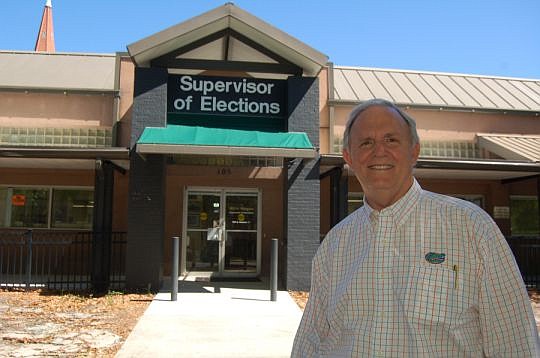
With only a primary and general election in Atlantic Beach on this year’s calendar, his days are nothing like they were during hectic pace just a few months ago leading up to the presidential election, but Duval County Supervisor of Elections Mike Hogan has a full schedule.
“Election Day is just the tip of the iceberg,” said Hogan.
As a member of the Florida State Association of Supervisors of Elections Legislative Committee, he’s been spending quite a bit of time in Tallahassee, staying abreast of the legislative session and a few bills that could affect voting.
The association’s top priority for the session is for lawmakers to allow Florida to join 20 states and the District of Columbia as a member of the Electronic Information Registration Center.
It’s a Washington, D.C.-based nonprofit that collects voter registration and motor vehicle licensee data and then shares it among its members.
Hogan said membership would help prevent voter fraud by preventing someone who is registered in another state from being able to also cast a ballot in Florida.
“Florida is a snowbird state and people live here part of the year,” he said, making it possible someone might be registered here and also in their primary residence state.
It’s not the first time the supervisors’ association has placed the proposal on the table, but the Legislature has in the past denied the request, based on concerns about sharing the data and security.
“Supervisors are interested only in getting it right. We have to make sure all the good votes count and that no fraudulent votes count,” Hogan said.
Another bill that’s on the radar would exempt elements of voter identification data other than name and address that would be considered public record.
Some voters have expressed concern that their status in the workplace might be compromised if their employer or co-workers knew their political party affiliation.
Others are concerned that other information, such as their telephone number or email address, could be made public.
“I can’t tell you how many people have called our office to give up their right to vote because they’re worried about their privacy,” said Hogan.
Another issue is limiting access to information about minors.
Hogan said under state law, supervisors are required to offer pre-registration to high school students, which means there’s a lot of data about 16- and 17-year-olds that is public record.
The third high-priority for supervisors would improve the procedure for dealing with mailed-in ballots when the voter’s signature on the ballot doesn’t match the signature on the voter registration record.
Hogan said people sign some documents differently than they sign other documents and some signatures change between the time they register to vote and when their ballot is questioned.
When the signatures don’t match, the voter must be notified of the discrepancy and given the opportunity to resolve it by returning a signed affidavit attesting to the ballot’s authenticity.
Under state law, the only way to notify a voter of the mismatched signature is through first class U.S. Mail, which Hogan said can take up to two days to deliver in Duval County. Add to that another two days for return mail — plus the number of days before the voter decides to execute the affidavit.
That process can slow down certification of a ballot, which could extend the time it might take to certify an election, Hogan said.
Under the proposed bill, supervisors would be allowed to verify a signature with the signature on the voter registration or with the signature on a military ID, driver’s license or passport.
On a more general topic, Hogan said even with advances in technology, don’t expect a move from the government, election supervisors or the electorate to make it possible for people to cast their vote via the Internet, even though many people conduct their business, including banking, online.
“People are much more passionate about their vote than they are about their money,” he said.
However, how a voter may register is going high-tech Oct. 1, when Florida residents will have the option to register to vote online instead of having to visit their county election office.
That’s expected to streamline the verification process on the front end because online registrations will be immediately merged with data from the Department of Motor Vehicles.
“It will be faster and more secure,” Hogan said.
He said no matter whether or how election law may or may not change, the No.1 priority when supervising elections is accuracy because when it comes to counting and verifying votes, “there are no do-overs.”
(904) 356-2466